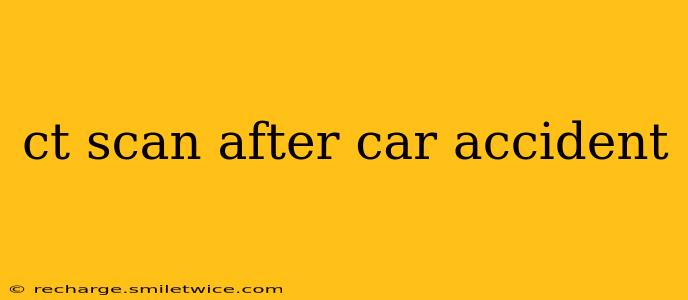A car accident can be a terrifying experience, leaving you shaken and potentially injured. One of the first steps in assessing the extent of your injuries is often a CT scan. But when is a CT scan necessary after a car accident, and what can you expect from the procedure? This comprehensive guide answers these questions and more, providing you with the knowledge you need to navigate this crucial aspect of post-accident care.
Why is a CT Scan Used After a Car Accident?
A CT scan, or computed tomography scan, uses X-rays and computer technology to create detailed cross-sectional images of your body. This allows doctors to visualize internal structures, including bones, organs, and soft tissues, much more clearly than a standard X-ray. After a car accident, a CT scan is frequently ordered to:
- Identify fractures: CT scans are excellent at detecting fractures in bones, including those in the skull, spine, ribs, pelvis, and limbs – injuries that might not be readily apparent on a physical exam.
- Detect internal bleeding: Internal bleeding (hemorrhage) can be life-threatening. A CT scan can quickly identify bleeding in the brain (intracranial hemorrhage), abdomen, or other areas.
- Assess organ damage: A car accident can cause damage to internal organs like the lungs, liver, spleen, and kidneys. CT scans help doctors assess the extent of any such injuries.
- Evaluate spinal cord injuries: While a CT scan doesn't show the nerve tissue directly, it can reveal fractures or dislocations of the vertebrae that may be compressing or damaging the spinal cord.
- Rule out other injuries: A CT scan can help rule out other serious injuries that might not be immediately obvious, leading to more effective treatment planning.
What are the common reasons a doctor might order a CT scan after a car accident?
Several factors influence a doctor's decision to order a CT scan following a car accident. These include:
- Mechanism of injury: The severity of the accident, such as the speed of impact, the type of collision, and the presence of rollover or ejection, significantly impacts the likelihood of a CT scan being ordered.
- Physical examination findings: The doctor's physical examination will reveal signs and symptoms of potential injuries. Things like loss of consciousness, severe pain, neurological deficits, or visible deformities might warrant a CT scan.
- Patient symptoms: Symptoms like headache, dizziness, nausea, vomiting, difficulty breathing, abdominal pain, or altered mental status can indicate the need for a CT scan.
What if I only have minor injuries from a car accident? Do I still need a CT scan?
Even with minor injuries, a CT scan might still be necessary. While seemingly insignificant injuries on the surface could potentially mask more serious underlying damage not visible to the naked eye. Your doctor will make the determination based on your individual situation.
How long does a CT scan take, and what should I expect during the procedure?
A CT scan usually takes only a few minutes. You'll lie on a table that slides into a large, donut-shaped machine. The machine rotates around you, taking a series of X-rays. You may be asked to hold your breath for short periods during the scan. The procedure is generally painless, though you might feel a bit claustrophobic if you’re sensitive to enclosed spaces.
What happens after a CT scan?
After the scan, you'll usually be able to go home. The radiologist will interpret the images and send a report to your doctor, who will discuss the results with you and explain the next steps in your treatment.
Are there any risks associated with a CT scan?
CT scans expose you to a small amount of ionizing radiation. While the risk from a single CT scan is generally low, it’s important to discuss any concerns about radiation exposure with your doctor, especially if you’ve had numerous CT scans in the past. The benefits of obtaining a CT scan in the case of a serious car accident usually far outweigh the risks.
This information is for general knowledge and informational purposes only, and does not constitute medical advice. Always consult with a qualified medical professional for any health concerns or before making any decisions related to your health or treatment.
